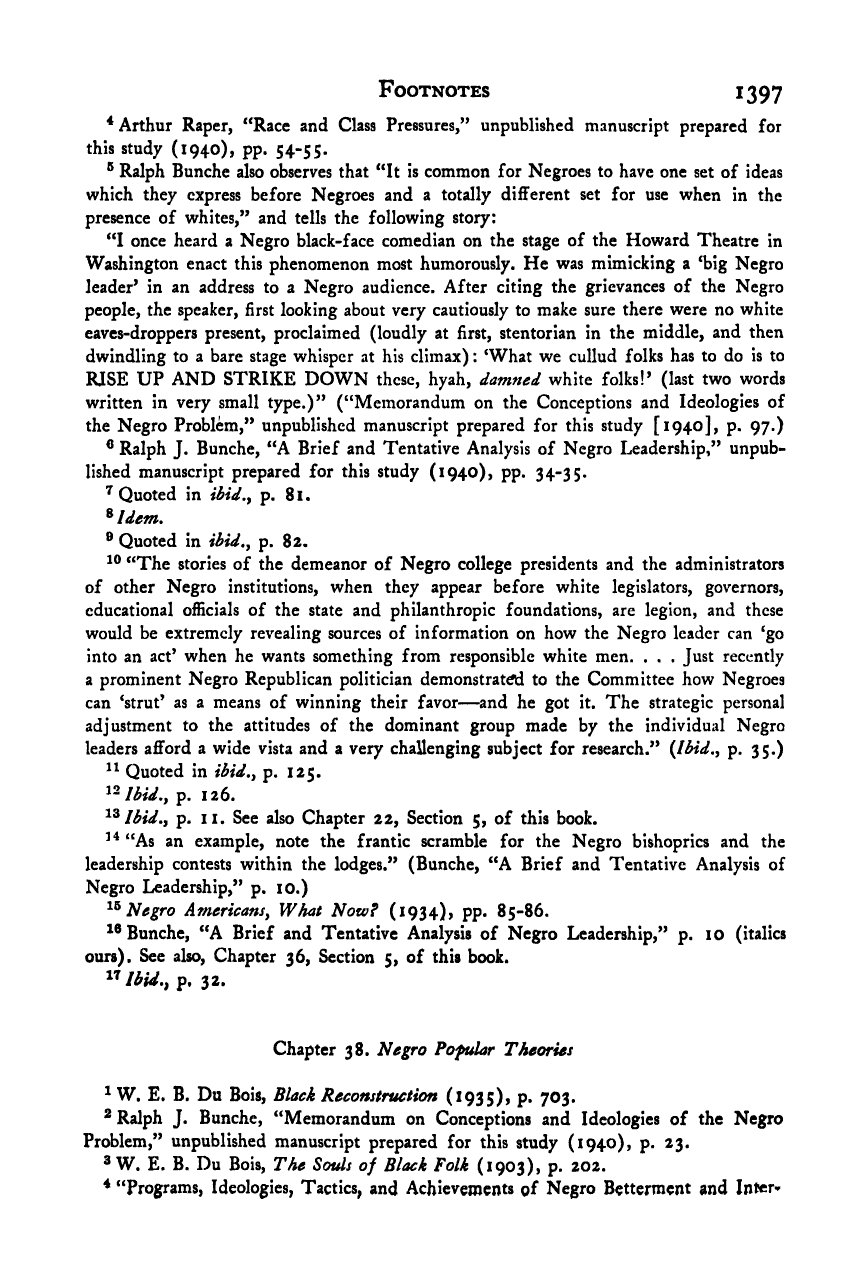Note: Gunnar Myrdal died in 1987, less than 70 years ago. Therefore, this work is protected by copyright, restricting your legal rights to reproduce it. However, you are welcome to view it on screen, as you do now. Read more about copyright.
Full resolution (TIFF) - On this page / på denna sida - Footnotes - Chapter 37 - Chapter 38

<< prev. page << föreg. sida << >> nästa sida >> next page >>
Below is the raw OCR text
from the above scanned image.
Do you see an error? Proofread the page now!
Här nedan syns maskintolkade texten från faksimilbilden ovan.
Ser du något fel? Korrekturläs sidan nu!
This page has never been proofread. / Denna sida har aldrig korrekturlästs.
Footnotes 1397
* Arthur Raper, “Race and Class Pressures,” unpublished manuscript prepared for
this study (1940), pp. 54-55.
® Ralph Bunche also observes that “It is common for Negroes to have one set of ideas
which they express before Negroes and a totally different set for use when in the
presence of whites,” and tells the following story:
“I once heard a Negro black-face comedian on the stage of the Howard Theatre in
Washington enact this phenomenon most humorously. He was mimicking a ‘big Negro
leader’ in an address to a Negro audience. After citing the grievances of the Negro
people, the speaker, first looking about very cautiously to make sure there were no white
eaves-droppers present, proclaimed (loudly at first, stentorian in the middle, and then
dwindling to a bare stage whisper at his climax) : ‘What we cullud folks has to do is to
RISE UP AND STRIKE DOWN these, hyah, damned white folks!’ (last two words
written in very small type.)” (“Memorandum on the Conceptions and Ideologies of
the Negro Problem,” unpublished manuscript prepared for this study [1940], p. 97.)
® Ralph J. Bunche, “A Brief and Tentative Analysis of Negro Leadership,” unpub-
lished manuscript prepared for this study (1940), pp. 34-35.
^ Quoted in ibid,^ p. 81.
^ Idem.
® Quoted in ibid.^ p. 82.
10
<‘T]ie stories of the demeanor of Negro college presidents and the administrators
of other Negro institutions, when they appear before white legislators, governors,
educational officials of the state and philanthropic foundations, are legion, and these
would be extremely revealing sources of information on how the Negro leader can ‘go
into an act’ when he wants something from responsible white men. . . .Just recently
a prominent Negro Republican politician demonstrate to the Committee how Negroes
can ‘strut’ as a means of winning their favor—and he got it. The strategic personal
adjustment to the attitudes of the dominant group made by the individual Negro
leaders afford a wide vista and a very challenging subject for research.” (Ibid,^ p. 35.)
Quoted in ibid.y p. 125.
Ibid., p. 126.
Ibid., p. II. See also Chapter 22, Section 5, of this book.
“As an example, note the frantic scramble for the Negro bishoprics and the
leadership contests within the lodges.” (Bunche, “A Brief and Tentative Analysis of
Negro Leadership,” p, 10.)
Negro Americans, What Now? (1934)9 pp. 85-86.
Bunche, “A Brief and Tentative Analysis of Negro Leadership,” p. 10 (italics
ours). See also, Chapter 36, Section 5, of this book.
Ibid. p, 32.
Chapter 38. Negro Pofular Theories
^ W. E. B. Du Bois, Black Reconstruction (1935)9 p. 703.
* Ralph J. Bunche, “Memorandum on Conceptions and Ideologies of the Negro
Problem,” unpublished manuscript prepared for this study (1940), p. 23.
® W. E. B. Du Bois, The Souls of Black Folk (1903), p. 202.
^ “Programs, Ideologies, Tactics, and Achievements gf Negro Betterment and Inter^^
<< prev. page << föreg. sida << >> nästa sida >> next page >>